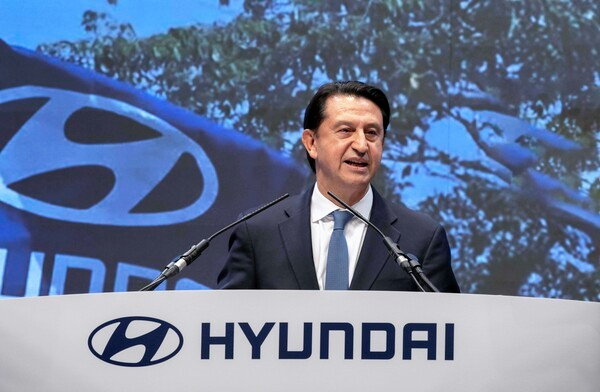 이미지 확대보기
이미지 확대보기José Muñoz joined Hyundai Motor in 2019 as Global COO and Head of the North and South America regional headquarters (President). Under his leadership, Hyundai’s sales strategy—focused on high-value models such as hybrids, SUVs, and electric vehicles—propelled the automaker to become the world’s third-largest automaker by sales volume.
In particular, as tariff risks under the Trump administration become a reality, Hyundai Motor is facing growing challenges in devising countermeasures.
Hyundai Motor and Kia sold a combined 893,152 vehicles in the U.S. in the first half of this year, accounting for about 40% of their total exports. This marks a new all-time high, up 9.2% from the same period last year. Hyundai sold 476,641 units (up 10.5%), while Kia sold 416,511 units (up 7.8%).
However, the Trump administration began imposing a 25% tariff on all imported vehicles in April and expanded it to auto parts in May, which is expected to erode profitability. Indeed, combined U.S. auto exports by Hyundai and Kia in the first half fell 16.8% from a year earlier to USD 15.34 billion.
According to FnGuide, Hyundai Motor and Kia’s second-quarter operating profits are estimated at KRW 3.612 trillion and KRW 3.082 trillion, respectively, down 15.6% and 15.4% year-on-year. Korea Investment & Securities estimates that tariff burdens for Hyundai and Kia will rise to KRW 5.127 trillion and KRW 4.216 trillion, respectively, for a combined KRW 9.343 trillion.
In response to U.S. tariff risks, José Muñoz is focusing on expanding local production capacity. Hyundai Motor Group Metaplant America (HMGMA) will increase its annual production from 300,000 to 500,000 units, with the Alabama and Georgia plants further boosting total U.S. output to 1.2 million units per year.
As a marketing expert, José Muñoz is reinforcing local promotions to maintain Hyundai’s U.S. market share. Hyundai Motor America recently extended its official vehicle discount program to Sept. 2. With local rivals Ford and GM raising prices due to tariffs, Hyundai aims to maintain price competitiveness.
Investment is now guided by “selection and concentration.” Hyundai Motor Group announced in March a plan to invest USD 21 billion (about KRW 30 trillion) in the U.S. over the next four years. As a result, future projects such as UAM (urban air mobility), autonomous driving, and robotics—originally earmarked for growth—are being scaled back. Hyundai last year announced plans to invest about KRW 22 trillion in these projects.
For example, Hyundai Motor’s Supernal—the startup pursuing commercial air taxis—recently laid off about 8% of its workforce as part of restructuring. Earlier this year, Hyundai Motor laid off 5% of the workforce at its robotics affiliate, Boston Dynamics. The company also implemented job cuts at Motional, its autonomous driving joint venture, last year. These companies are responsible for future businesses but currently incur more R&D expenses than profits.
At the same time, José Muñoz continues to engage in active field management through employee town hall meetings, seeking to unite employees to overcome uncertainty.
He held his first town hall at the Namyang R&D Center in February, introducing his strategy to about 800 employees. In March, he visited Hyundai’s U.K. operations and Hyundai Motor India in Gurugram. Most recently, in June, he visited regional business sites for the first time, checking on sales and marketing.
At these meetings, José Muñoz emphasized, “Amid geopolitical uncertainty in the third quarter, let’s focus on what we can control. What we can control is providing customers with beautifully designed, high-quality, and safe vehicles.”
Kim JaeHun (rlqm93@fntimes.com)
[관련기사]
- What is Hyundai and Kia's Strategy to Counter Trump's Tariffs with a 40% U.S. Production Share?"
- The Engineer Who Researched Wearable Robots Rises as the Core of Hyundai Motor’s Robotics Business
- Hyundai Motor Alters Self-Driving Tech Focus… Hyundai AutoEver's Standing at Risk, CEO Kim Yoon-gu Faces Strategic Test
- Why Hyundai Motor Group Purchased Land in Yongin, Yangsan, and Gunsan
가장 핫한 경제 소식! 한국금융신문의 ‘추천뉴스’를 받아보세요~
데일리 금융경제뉴스 Copyright ⓒ 한국금융신문 & FNTIMES.com
저작권법에 의거 상업적 목적의 무단 전재, 복사, 배포 금지



















